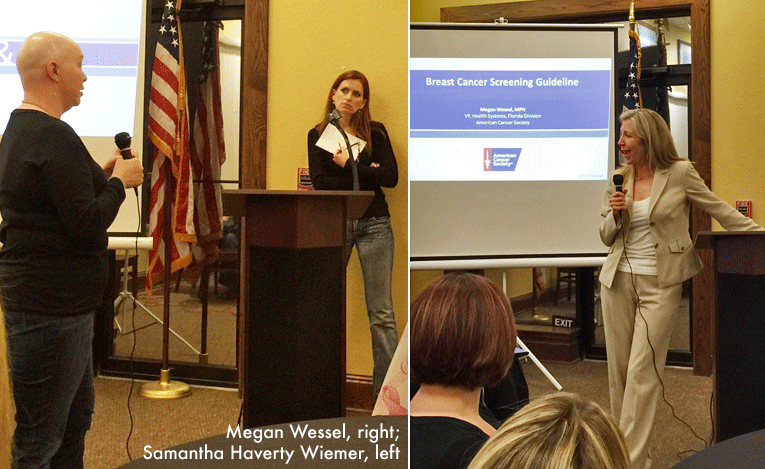Local event addresses health concerns for new screening guidelines
WHEN NEW GUIDELINES for breast cancer screening were released October 20 by the American Cancer Society (ACS), the public reaction was swift and concerned. Many women were alarmed — particularly those who had been diagnosed with breast cancer by way of early screenings.
The new guidelines call for women to start having mammograms at age 45. Previously, the age was 40. And, the American Cancer Society was no longer recommending clinical breast exams as a screening tool.
These issues were top-of-mind when a group of about 50 women gathered in Lakeland to hear from an ACS spokeswoman, Megan Wessel. Vice-president of health systems for the society’s Florida group, she came to the Cleveland Heights Country Club on November 5.
Wessel was prepared with a PowerPoint on the guidelines, but perhaps more impactful was her compassion and understanding while addressing a tense audience. She said she’s lost friends and family to cancer, and is herself in a higher risk category for breast cancer. “This is personal,” she said. “So when I talk to you, I am wearing two hats.”
She assured event attendees that the guideline changes do not mean women won’t be able to have mammograms when they feel they should. The last guideline changes came out in 2003, she observed. “Frankly, it’s overdue,” she added.
The main takeaway of the new guidelines are as follows:
• At 40: Speak with your physician and make a decision on when to begin having mammograms.
• At 45: Begin having annual mammograms and continue for 10 years.
• At 55: Change to having mammograms every other year, or continue having them each year.
The ACS guidelines were created with no input from health insurance companies, she said. “We focused solely on women; purely on women’s health,” she continued. Unfortunately, not enough focus went toward the best way to distribute the new information, she said. “We know it saves lives,” she said. “It’s just a shame, because we upset a lot of people.”
Samantha Haverty Wiemer, who attended the information session, said she was one of those. She was diagnosed with breast cancer this year. While mammography was not the reason hers was detected, she said she disagrees with the ACS guideline changes. “What is the harm of a doctor’s exam? I don’t understand why you would stop it; not recommend it,” Wiemer stated.
If women and their physicians want to continue with those exams, that is their choice. In fact, the idea is for women to be as informed as possible and make the best decision for themselves. “We want women to be empowered,” she said.
One day, there will hopefully be better screening tools available and means of prevention. “Unfortunately, mammograms don’t prevent cancer,” she observed.
Wessel said many women still do not have mammograms at all — a problem that should be addressed. Statewide, 57.5 percent of women in Florida between 40 and 74 have the exams, she said. In Polk County, that percentage is only 50.7 percent.
In conclusion, Wessel said the society remains in its role as supporter of women with breast cancer. “We will be there for breast cancer patients, whether you want to support us in this or not. Some of you are not going to be happy when you leave tonight.”
CREDITS
article and photos by MARY TOOTHMAN
